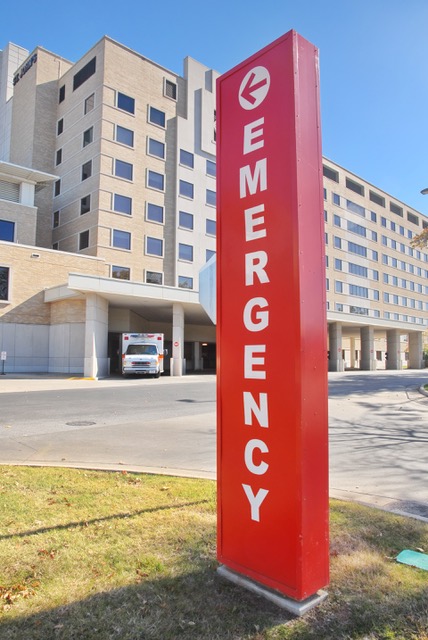The Slowness of Emergency
In the first hospital, the waiting room is heaving with the tide of the unwell. An enormous man sits at the triage desk. He’s a giant egg in a red jumper and when he draws himself up to his full height, his shins are crimson sores. He walks as if his legs are made of wood. He’s having trouble finding a seat because there are never enough seats in Emergency rooms at hospitals. They just don’t build enough. I give the man mine and Alan and I stand and a woman built like a small ship tells us to put masks on. The masks are stiff beaks like something from the days of Plague. They stop all movement of air. Alan whispers ‘maybe we should try another hospital’. We leave and weave through the Saturday bumper to bumper traffic, and finally we make our way through the crowded day to another hospital.
Here the waiting room is also full but this time, we grab two seats together where we will sit for the next three hours but we don’t know that then. A pause like peace descends. We know we will get help. The triage nurse has decided. The masks are better too.
I notice the Greeks first. The Greek man, though he’s not young, is outside trying to lift his wife from the car into the wheelchair. He braces himself four or five times and dives repeatedly trying to grab her and place her in the wheelchair. Finally he succeeds. She is as small as a child in her tartan dressing gown and leopard print slippers. He’s in a beige fleece and a baseball cap. Inside he sits in the wheelchair so that she, like a child at the big table, can sit in a chair, legs swinging, but she is restless and wants to move on.
The men wear mostly dark colours, one is chatty and says he could lift her with one hand. And the light laughter of people confined, rises like a cloud. It’s the banter of strangers that gives a sense of belonging. Her husband goes to the car and gets a walking frame and now she’s slowly doing listing laps while he holds her arm. He is patient and gentle.
A haughty old woman asks, maybe to all of us, ‘Are you speaking to me?’ There are no secrets in the waiting room and I hear her say her age and realise she is four years younger than my mother would be had she survived lung cancer. And I think of Mum’s kindness, her lightness. The haughty one’s daughter is in her sixties and wearing a pink jumper and leggings covered in grinning cats with fangs. Both wear heavy gold jewellery. The mother tells her she should get some lessons in tennis. She was good at it once apparently. The daughter glances at me and away. They pay the hospital emergency fee in cash.
A young woman all in orange, hogs two chairs by putting her feet up and covering herself in a blanket. She hides for about two hours. A woman in silver from head to toe, passes quickly and then back again, a small sprite busy pushing air around, like a silver fairy. The young man next to me explains to his girlfriend that he has high blood pressure and she immediately goes to get coffee, which may be unwise. He helps the Greek man wrangle his tiny wife into the wheelchair again. We are all in masks and the window is open to the cold air, to ambulances and tall stands of fuchsias, their pink flowers like small open mouths. This slowness of emergency becomes clear.
After so long waiting, I am taken inside and strapped to an ECG machine for the rest of the day. Alan reads. Horses race on the TV, thrashed with whips for doing what they are supposed to enjoy. Nurses flutter in, do things to other things, tell you their names and leave. A doctor checks to see if my ankles are swollen.
A groaning man is just beyond the curtain. The nurse says he must go back to the nursing home tonight because they miss him. Hmm. She says his daughter has called and he pauses, stumped with emotion, and begins to cry. ‘They are so lovely and they work so hard,’ he weeps. He probably worked so hard once and now he’s completely alone. He is wheeled off for a CAT scan.
When he comes back, he asks for a bottle because he needs to go to the toilet. They give him one. He’s been groaning as if in pain all day, which is hard to hear. Then he calls out loud and panicked, ‘Excuse me, could somebody help me? I’m sorry but in this situation, at this time, I am not able.’ And he wets himself all over his hospital gown.
After five hours behind the polyester curtain, I am allowed to go home and when the port comes out of my arm, inconvenient blood spurts everywhere. There is nothing to stop it but a little pack of wipes and I think, the insistence of blood is life.

